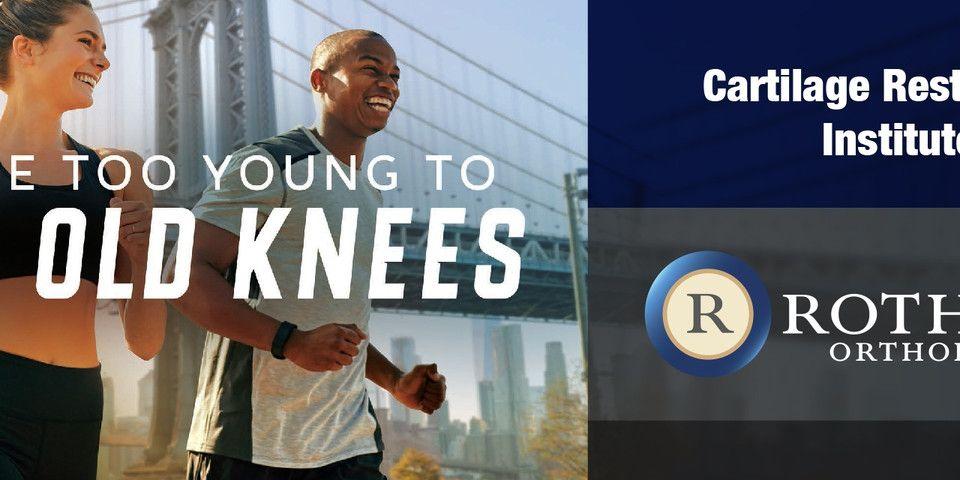Rothman Orthopaedic Institute Specializes in Cartilage Recovery
Have you experienced a meniscus tear or a traumatic injury that affects the knee cartilage? Or have years of degeneration from a chronic orthopaedic knee condition caused painful symptoms to emerge in your knee joint?
Whether your knee condition is traumatic or degenerative in nature, the symptoms associated with cartilage issues can be severe and, in many cases, debilitating. If you are living with these symptoms, you’re probably anxious to pursue a treatment method that will produce real results—but you aren’t quite ready for a total knee replacement just yet.
There are numerous treatments to alleviate the symptoms of knee arthritis, including cartilage restoration surgery which will actually help to renew your cartilage—not just manage the symptoms. So, what should you pursue—non-operative measures or knee cartilage surgery? And what can you expect from the treatment processes?
At Rothman Orthopaedic Institute, our knee specialists have unmatched experience in cartilage recovery in Bergen County. We’ll help you to better understand the options and processes ahead of you. Let’s get started.
Three Options for Cartilage Recovery in Bergen County
The first step of the cartilage restoration process, naturally, is to diagnose and fully understand the exact nature of the cartilage injury you’ve suffered. This requires a physical examination and imaging tests performed by qualified orthopaedic specialists.
Your diagnosis will reveal the degree of damage your knee cartilage has experienced. In some cases, damage and degeneration will be limited to a small portion of the knee joint. In others, the knee cartilage may be severely compromised or even detached. If pieces of cartilage have broken from the associated bones, loose bodies may be present in the knee joint.
The nature of your injury will determine the best course of treatment. Let’s take a closer look at three treatment options that may be recommended for your Bergen County cartilage recovery.
Non-Operative Cartilage Recovery
Patients who have experienced mild cartilage injuries or who have an early-stage degenerative condition (such as arthritis or avascular necrosis) may be able to avoid surgery entirely. Knee cartilage that is fully intact (no detachment) and only featuring limited areas of degeneration may be effectively treated with non-operative therapies and treatments.
While these treatments will not actively restore damaged cartilage (without surgical intervention, cartilage tissue that has been damaged or lost will not grow back), they will help to prevent further degeneration and to manage associated symptoms. Recommended treatment options may include:
-
Lifestyle alterations (such as weight loss) and activity moderation
-
Non-steroidal anti-inflammatory medications
-
Physical therapy and strength-building exercises
-
Steroidal injections (such as cortisone)
Cartilage Restoration Surgery
If your knee cartilage injury is of a more serious degree—particularly if cartilage detachment or loose bodies are present—or if non-operative treatment options have proven insufficient, cartilage restoration surgery will typically be recommended.
There are two main types of cartilage restoration surgery:
-
Autologous Chondrocyte Implantation
This arthroscopic procedure involves harvesting healthy cartilage cells from unaffected areas of the knee (multiplying them in a lab) and then later implanting these cells into the damaged region during a second operation. -
Osteochondral Transplant
In this procedure, cartilage and bone plugs are harvested from an uninjured, non-weight bearing section of the knee or a doner; the cartilage and bone plugs are then transplanted to cover the damaged section of bone and cartilage.
For the most severe cases of knee arthritis, a knee replacement is usually the most effective solution. However, for those who are still young and active and hoping to extend the functionality of their natural joints for as long as possible, cartilage restoration may be the ideal solution.
Knee Joint Replacement
If restorative surgical intervention will not be able to sufficiently address cartilage damage, revive function, and manage symptoms, a partial or total knee joint replacement may be recommended.
This operation involves the removal of damaged cartilage and bone from the knee joint and replacement of these damaged parts with prosthetic components. Knee joint replacement is a major procedure; however, it is capable of dramatically eliminating symptoms and restoring function. In fact, it features one of the highest rates of patient satisfaction among orthopaedic operations.
Learn More or Schedule an Appointment
Do you have unanswered questions about the treatment options and processes for cartilage recovery in Bergen County? The experts at Rothman Orthopaedic Institute have the answers you need. To learn more or to schedule an appointment, please visit us here or contact us at 1-800-321-9999.
Related Specialties
Related Treatments
- Arthroscopic Meniscal Repair
- Bilateral Knee Replacement
- Cartilage Injury Treatments
- Cartilage Restoration
- Loose Bodies/Spurs Surgery (Knee)
- Meniscal Tear Surgery
- Meniscal Transplant Surgery
- Minimally Invasive Knee Surgery
- Non-operative Knee Arthritis Treatment
- Non-operative Meniscal Tear Treatment
- Non-operative Runner's Knee (Chondromalacia Patella) Treatment
- Non-Operative Treatment Alternatives for Loose Bodies in the Knee
- Partial Knee Replacement (Unicompartmental and Patellofemoral Replacement)
- Revision Knee Surgery
- Total Knee Arthroplasty
- Total Knee Replacement
Related Services
Related Programs
-

Cartilage Restoration Institute
This is a center where patients can go to have their disabled joint biological resurfaced, realigned, and stabilized without having the joint replaced by artificial materials such as metal and plastic. It is well known that the outcomes of patients under the age of 50 undergoing artificial joint replacement are not as good as we would like. Therefore we feel the future of Orthopaedics is to try to restore a joint back to its original anatomy by realignment, ligament reconstruction, and cartilage restoration.Read More





